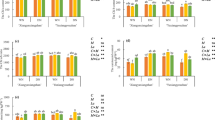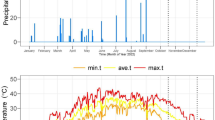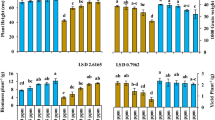Abstract
Foliar application of ZnO Nanoparticles (ZnO-NPs) could reduce adverse effects of multiple abiotic stresses in crop plants. The present study was conducted to induce the low temperature stress tolerance in growing rice plants by the foliar application of ZnO-NPs. Two fragrant rice cultivars i.e., Meixiangzhan2 and Xiangyaxiangzhan were grown under normal temperature (NT, day/night: 28℃/25℃) and low temperature (LT, day/night: 15℃/12℃) after foliar application of Zn and ZnO-NPs with following treatments viz., application of distilled water only (CK), ZnSO4·7H2O at 6.6 mg·L −1 (CK1), and application of ZnO-NPs at 25, 50, 100, and 200 mg·L−1 regarded as N25, N50, N100, and N200, respectively. The growth and physiological attributes were examined to assess the potential of ZnO-NPs to induce low temperature stress tolerance in growing rice plants. The ZnO-NPs, and temperature × ZnO-NPs had a significant effect on the growth and physiological attributes (p < 0.05) of rice seedlings. The ZnO-NPs application enhanced the root dry weight, root-shoot ratio, total dry weight, and chlorophyll a/b ratio in Xiangyaxiangzhan by 10.48%-18.10%, 1.96%-20.31%, 3.25%-6.02%, and 3.70%-6.11% at low temperature, respectively. The activity of antioxidant enzymes in Meixiangzhan 2 was increased, whilst the malondialdehyde (MDA) content in root was significantly declined. Moreover, lower levels of ZnO-NPs treatment regulated the activity of N-metabolizing enzymes i.e., nitrate reductase (NR), glutamate synthase (GS), glutamine oxoglutarate aminotransferase (GOGAT) and in seedlings under low temperature. Regarding correlation analysis, the N100 and N200 treatment exhibited a stronger correlation with growth-related attributes, compared to other treatments. Foliar application of ZnO-NPs at appropriate concentration (100 mg·L−1) could alleviate the inhibitory effect of low temperature stress on the early growth of fragrant rice.









Similar content being viewed by others
Data Availability
The data sets supporting the results of this article are included within the article.
Code Availability
No code.
References
Aqeel M, Ran J, Hu W, Kashif M, Dong L, Adnan M, Eldesoky GE, Muteb A, Fatt L, Deng J (2023) Plant-soil-microbe interactions in maintaining ecosystem stability and coordinated turnover under changing environmental conditions. Chemosphere 318:137924. https://doi.org/10.1016/j.chemosphere.2023.137924
Ashraf U, Hussain S, Shahid MN, Anjum SA, Kondo M, Mo ZW, Tang XR (2022) Alternate wetting and drying modulated physio-biochemical attributes, grain yield, quality, and aroma volatile in fragrant rice. Physiol Plant 174:14. https://doi.org/10.1111/ppl.13833
Basit F, Nazir MM, Shahid M, Abbas S, Javed MT, Naqqash T, Liu YH, Guan YJ (2022) Application of zinc oxide nanoparticles immobilizes the chromium uptake in rice plants by regulating the physiological, biochemical and cellular attributes. Physiol Mol Biol Plants 28:1175–1190. https://doi.org/10.1007/s12298-022-01207-2
Borjas AH, De Leon TB, Subudhi PK (2016) Genetic analysis of germinating ability and seedling vigor under cold stress in US weedy rice. Euphytica 208:251–264. https://doi.org/10.1007/s10681-015-1584-z
Chen J, Dou RZ, Yang ZZ, You TT, Gao X, Wang L (2018) Phytotoxicity and bioaccumulation of zinc oxide nanoparticles in rice (Oryza sativa L.). Plant Physiol Biochem 130:604–612. https://doi.org/10.1016/j.plaphy.2018.08.019
Cheng YX, Wang XZ, Guo JP, Zhao YX, Huang JF (2014) Dynamic monitoring of spring cold damage of double cropping rice in Southern China. Scientia Agricultura Sinica 47:4790–4804. https://doi.org/10.3864/j.issn.0578-1752.2014.24.003(inChinese)
Elshayb OM, Farroh KY, Amin HE, Atta AM (2021) Green synthesis of zinc oxide nanoparticles: fortification for rice grain yield and nutrients uptake enhancement. Molecules 26:17. https://doi.org/10.3390/molecules26030584
Huang M (2023) The association between the risk of diabetes and white rice consumption in China: Existing knowledge and new research directions from the crop perspective. J Integr Agric 22:3234–3236. https://doi.org/10.1016/j.jia.2023.06.036
Huang LK, Wang SC, Terashima I, Zhang X, Lin DX, Osmond CB (1989) Chilling injury in mature leaves of rice. I. Varietal differences in the effects of chilling on canopy photosynthesis under simulated “dry cold dew wind” conditions experienced in south-east China. Aust J Plant Physiol 16:321. https://doi.org/10.1071/pp9890321
Huang M, Jiang LG, Zou YB, Zhang WX (2013) On-farm assessment of effect of low temperature at seedling stage on early-season rice quality. Field Crop Res 141:63–68. https://doi.org/10.1016/j.fcr.2012.10.019
Huang ZL, Xie WJ, Wang M, Liu XW, Ashraf U, Qin DJ, Zhuang MS, Li W, Li YZ, Wang SL, Tian H, Mo ZW (2020) Response of rice genotypes with differential nitrate reductase- dependent NO synthesis to melatonin under ZnO nanoparticles’ (NPs) stress. Chemosphere 250:12. https://doi.org/10.1016/j.chemosphere.2020.126337
Hussain S, Khan F, Hussain HA, Nie LX (2016) Physiological and biochemical mechanisms of seed priming-induced chilling tolerance in rice cultivars. Front Plant Sci 7:116. https://doi.org/10.3389/fpls.2016.00116
Imran M, Shafiq S, Ashraf U, Qi JY, Mo ZW, Tang XR (2023) Biosynthesis of 2-acetyl-1-pyrroline in fragrant rice: recent insights into agro-management, environmental factors, and functional genomics. J Agric Food Chem 71:4201–4215. https://doi.org/10.1021/acs.jafc.2c07934
Indhira D, Krishnamoorthy M, Ameen F, Bhat SA, Arumugam K, Ramalingam S, Priyan SR, Kumar GS (2022) Biomimetic facile synthesis of zinc oxide and copper oxide nanoparticles from Elaeagnus indica for enhanced photocatalytic activity. Environ Res 212:9. https://doi.org/10.1016/j.envres.2022.113323
Islam F, Khan MSS, Ahmed S, Abdullah M, Hannan F, Chen J (2023) OsLPXC negatively regulates tolerance to cold stress via modulating oxidative stress, antioxidant defense and JA accumulation in rice. Free Radic Biol Med 199:2–16. https://doi.org/10.1016/j.freeradbiomed.2023.02.008
Ismail AFM, Ali MM, Ismail LFM (2014) Photodynamic therapy mediated antiproliferative activity of some metal-doped ZnO nanoparticles in human liver adenocarcinoma HepG2 cells under UV irradiation. J Photochem Photobiol B-Biol 138:99–108. https://doi.org/10.1016/j.jphotobiol.2014.04.006
Jia Y, Zou DT, Wang JG, Liu HL, Inayat MA, Sha HJ, Zheng HL, Sun J, Zhao HW (2015) Effect of low water temperature at reproductive stage on yield and glutamate metabolism of rice (Oryza sativa L.) in China. Field Crop Res 175:16–25. https://doi.org/10.1016/j.fcr.2015.01.004
Kah M, Tufenkji N, White JC (2019) Nano-enabled strategies to enhance crop nutrition and protection. Nat Nanotechnol 14:532–540. https://doi.org/10.1038/s41565-019-0439-5
Khan AR, Azhar W, Wu JY, Ulhassan Z, Salam A, Zaidi SHR, Yang SQ, Song G, Gan YB (2021) Ethylene participates in zinc oxide nanoparticles induced biochemical, molecular and ultrastructural changes in rice seedlings. Ecotox Environ Safe 226:13. https://doi.org/10.1016/j.ecoenv.2021.112844
Khan AU, Khan M, Malik N, Parveen A, Sharma P, Min K, Gupta M, Alam M (2022) Screening of biosynthesized zinc oxide nanoparticles for their effect on Daucus carota pathogen and molecular docking. Microsc Res Tech 85:3365–3373. https://doi.org/10.1002/jemt.24191
Kong LL, Ashraf U, Cheng SR, Rao GS, Mo ZW, Tian H, Pan SG, Tang XR (2017) Short-term water management at early filling stage improves early-season rice performance under high temperature stress in South China. Eur J Agron 90:117–126. https://doi.org/10.1016/j.eja.2017.07.006
Lai RF, Li SY, Cen ZB, Gan DJ, Tang XR, Duan MY, Pan SG, Tian H, Wang SL, Mo ZW (2019) Morphological and physiological response of seedlings of different fragrant rice genotype to low temperature. China Rice 25:24–28. https://doi.org/10.3969/j.issn.1006-8082.2019.02.006(inChinese)
Li SY, Jiang HL, Wang JJ, Wang YD, Pan SG, Tian H, Duan MY, Wang SL, Tang XR, Mo ZW (2019) Responses of plant growth, physiological, gas exchange parameters of super and non-super rice to rhizosphere temperature at the tillering stage. Sci Rep 9:17. https://doi.org/10.1038/s41598-019-47031-9
Li YZ, Liang LX, Li W, Ashraf U, Ma L, Tang XR, Pan SG, Tian H, Mo ZW (2021) ZnO nanoparticle-based seed priming modulates early growth and enhances physio-biochemical and metabolic profiles of fragrant rice against cadmium toxicity. J Nanobiotechnol 19:19. https://doi.org/10.1186/s12951-021-00820-9
Liao GX, Yang YH, Xiao WM, Mo ZW (2022) Nitrogen modulates grain yield, nitrogen metabolism, and antioxidant response in different rice genotypes. J Plant Growth Regu 12. https://doi.org/10.1007/s00344-022-10684-4
Lin D, Xing B (2007) Phytotoxicity of nanoparticles: inhibition of seed germination and root growth. Environ Pollut 150:243–250. https://doi.org/10.1016/j.envpol.2007.01.016
Liu ZL, Meng JR, Sun ZF, Su JK, Luo XY, Song JM, Li PF, Sun YK, Yu CL, Peng XL (2022a) Zinc application after low temperature stress promoted rice tillers recovery: Aspects of nutrient absorption and plant hormone regulation. Plant Sci 314:10. https://doi.org/10.1016/j.plantsci.2021.111104
Liu ZL, Su JK, Luo XY, Meng JR, Zhang HN, Li PF, Sun YK, Song JM, Peng XL, Yu CL (2022b) Nitrogen limits zinc-mediated stimulation of tillering in rice by modifying phytohormone balance under low-temperature stress. Food and Energy Security 11:20. https://doi.org/10.1002/fes3.359
Lv XM, Zhou GS (2018) A review on main meteorological disaster of double-cropping rice in China. J Appl Meteorol Sci, 29: 385–395. https://doi.org/10.11898/1001-7313.20180401 (in Chinese)
Ma L, Huang ZL, Li SY, Ashraf U, Yang WJ, Liu HC, Xu DTS, Li W, Mo ZW (2021) Melatonin and nitrogen applications modulate early growth and related physio-biochemical attributes in maize under Cd stress. J Soil Sci Plant Nutr 21:978–990. https://doi.org/10.1007/s42729-021-00415-1
Ma C, Gui W, Zhang YY, Shah AZ, Xu G, Yang GQ (2022) Combined physio-biochemical and transcriptome analyses illuminate the resistance response of rice priming with decoyinine against nilaparvata lugens. Agronomy-Basel 12:15. https://doi.org/10.3390/agronomy12123098
Mo Z, Li W, Pan S, Fitzgerald TL, Xiao F, Tang Y, Wang Y, Duan M, Tian H, Tang X (2015) Shading during the grain filling period increases 2-acetyl-1-pyrroline content in aromatic rice. Rice 8:1–10
Mo ZW, Ashraf U, Pan SG, Kanu AS, Li W, Duan MY, Tian H, Tang XR (2016) Exogenous application of plant growth regulators induce chilling tolerance in direct seeded super and non-super rice seedlings through modulations in morpho-physiological attributes. Cereal Res Commun 44:524–534. https://doi.org/10.1556/0806.44.2016.010
Mo ZW, Pan SG, Ashraf U, Kanu AS, Li W, Wang ZM, Duan MY, Tian H, Kargbo MB, Tang XR (2017) Local climate affects growth and grain productivity of precision hill-direct-seeded rice in South China. Appl Ecol Environ Res 15:113–125. https://doi.org/10.15666/aeer/1501_113125
Tanveer M, Shahzad B, Ashraf U (2020) Nanoparticle application and abiotic-stress tolerance in plants. Plant Life Under Changing Environment, pp 627–641. https://doi.org/10.1016/B978-0-12-818204-8.00027-8
Movafeghi A, Khataee A, Abedi M, Tarrahi R, Dadpour M, Vafaei F (2018) Effects of TiO2 nanoparticles on the aquatic plant spirodela polyrrhiza: evaluation of growth parameters, pigment contents and antioxidant enzyme activities. J Environ Sci 64:130–138. https://doi.org/10.1016/j.jes.2016.12.020
Naoki H, Amane M, Satoshi Y, Tadahiko M (2005) The photosynthetic properties of rice leaves treated with low temperature and high irradiance. Plant Cell Physiol 46:1377–1383. https://doi.org/10.1093/pcp/pci149
Rahimi G, Mohammad KS, Zarei M, Shokoohi M, Oskoueian E, Poorbagher MRM, Karimi E (2022) Zinc oxide nanoparticles synthesized using Hyssopus Officinalis L extract induced oxidative stress and changes the expression of key genes involved in inflammatory and antioxidant Systems. Biol Res 55:10. https://doi.org/10.1186/s40659-022-00392-4
Rao GS, Ashraf U, Kong LL, Mo ZW, Xiao LZ, Zhong KY, Rasul F, Tang XN (2019) Low soil temperature and drought stress conditions at flowering stage affect physiology and pollen traits of rice. J Integr Agric 18:1859–1870. https://doi.org/10.1016/s2095-3119(18)62067-2
Rativa AGS, de Araújo Junior AT, da Silva FD, Gastmann R, Lamb TI, dos Santos SA, Adamski JM, Fett JP, Ricachenevsky FK, Sperotto RA (2020) Root responses of contrasting rice genotypes to low temperature stress. J Plant Physiol 255:153307. https://doi.org/10.1016/j.jplph.2020.153307
Rossi L, Fedenia LN, Sharifan H, Ma XM, Lombardini L (2019) Effects of foliar application of zinc sulfate and zinc nanoparticles in coffee (Coffea arabica L.) plants. Plant Physiol Biochem 135:160–166. https://doi.org/10.1016/j.plaphy.2018.12.005
Sabir S, Zahoor MA, Waseem M, Siddique MH, Shafique M, Imran M, Hayat S, Malik IR, Muzammil S (2020) Biosynthesis of ZnO Nanoparticles usingbacillus subtilis: characterization and nutritive significance for promoting plant growth in Zea mays L. Dose-Response 18:9. https://doi.org/10.1177/1559325820958911
Scherzad A, Meyer T, Kleinsasser N, Hackenberg S (2017) Molecular mechanisms of zinc oxide nanoparticle-induced genotoxicity short running title: genotoxicity of ZnO-NPs. Materials 10:19. https://doi.org/10.3390/ma10121427
Shang Y, Hasan MK, Ahammed GJ, Li M, Yin H, Zhou J (2019) Applications of nanotechnology in plant growth and crop protection: A review. Molecules 24:2558. https://doi.org/10.3390/molecules26082196
Singh A, Prasad SM, Singh S (2018) Impact of nano ZnO on metabolic attributes and fluorescence kinetics of rice seedlings. Environ Nanotechno Monitoring Manag 9:42–49. https://doi.org/10.1016/j.enmm.2017.11.006
Sipaseuth BJ, Fukai S, Farrell TC, Senthonghae M, Sengkeo PS, Linquist B, Chanphengsay M (2007) Opportunities to increasing dry season rice productivity in low temperature affected areas. Field Crop Res 102:87–97. https://doi.org/10.1016/j.fcr.2007.03.001
Song U, Kim J (2020) Zinc oxide nanoparticles: a potential micronutrient fertilizer for horticultural crops with little toxicity. Hortic Environ Biotechnol 61:625–631. https://doi.org/10.1007/s13580-020-00244-8
Song Y, Jiang M, Zhang HL, Li RQ (2021a) Zinc oxide nanoparticles alleviate chilling stress in rice (Oryza Sativa L) by regulating antioxidative system and chilling response transcription factors. Molecules 26:12. https://doi.org/10.3390/molecules26082196
Song Y, Wang BQ, Qiu DY, Xie ZM, Dai S, Li C, Xu SL, Zheng YC, Li S, Jiang M (2021b) Melatonin enhances metallic oxide nanoparticle stress tolerance in rice via inducing tetrapyrrole biosynthesis and amino acid metabolism. Environ Sci-Nano https://doi.org/10.1039/d1en00244a
Song ZH, Gao WJ, Liu FL, Xie N, Sang YW, Huang WH (2022) Review on the cold dew wind damage of double-cropping late rice in southern region. Chin J Agrometeorol 43:37–49. https://doi.org/10.3969/j.issn.1000-6362.2022.01.004(inChinese)
Wang FY, Adams CA, Shi ZY, Sun YH (2018) Combined effects of ZnO-NPs and Cd on sweet sorghum as influenced by an arbuscular mycorrhizal fungus. Chemosphere 209:421–429. https://doi.org/10.1016/j.chemosphere.2018.06.099
Xie GS, Kato F, Imai R (2012) Biochemical identification of the OsMKK6-OsMPK3 signalling pathway for chilling stress tolerance in rice. Biochemical Journal 443:95–102. https://doi.org/10.1042/bj20111792
Xin F, Xiao X, Dong J, Zhang G, Li B (2019) Large increases of paddy rice area, gross primary production, and grain production in Northeast China during 2000–2017. Sci Total Environ 711:10. https://doi.org/10.1016/j.scitotenv.2019.135183
Yang GY, Yuan HY, Ji HT, Liu HJ, Zhang YF, Wang GD, Chen LG, Guo Z (2021) Effect of ZnO nanoparticles on the productivity, Zn biofortification, and nutritional quality of rice in a life cycle study. Plant Physiol Biochem 163:87–94. https://doi.org/10.1016/j.plaphy.2021.03.053
Zhang Q, Chen QH, Wang SL, Hong YH, Wang ZL (2014) Rice and cold stress: methods for its evaluation and summary of cold tolerance-related quantitative trait loci. Rice 7:12. https://doi.org/10.1186/s12284-014-0024-3
Zhang H, Wang R, Chen Z, Cui P, Lu H, Yang Y, Zhang H (2021) The Effect of zinc oxide nanoparticles for enhancing rice (Oryza sativa L.) yield and quality. Agriculture 11:12. https://doi.org/10.3390/agriculture11121247
Zhou XQ, Chen DG, Li LJ, Liu CG, Zhang X, Chen YD (2013) Effects of chilling stress on growth of double cropping rice in South China at seedling stage. Southwest China J Agric Scie 26:936–941. https://doi.org/10.16213/j.cnki.scjas.2013.03.057. ((in Chinese))
Acknowledgements
The Shanwei City provincial science and technology innovation strategy special project (2022B002), the Guangdong Basic and Applied Basic Research Foundation (2020B1515020034), the earmarked fund for CARS—01, the Guangdong Provincial Key Field Research and Development Plan Project (2019B020221003), the National Natural Science Foundation of China (31971843), and the Modern Agro-industrial Technology System of Guangdong Province (2020KJ105).
Funding
The Shanwei City provincial science and technology innovation strategy special project (2022B002), the Guangdong Basic and Applied Basic Research Foundation (2020B1515020034), the earmarked fund for CARS—01, the Guangdong Provincial Key Field Research and Development Plan Project (2019B020221003), the National Natural Science Foundation of China (31971843), and the Modern Agro-industrial Technology System of Guangdong Province (2020KJ105).
Author information
Authors and Affiliations
Contributions
Zhaowen Mo designed the experiments; Siying Deng and Yiming Mai investigated the traits; Siying Deng, Yiming Mai, Yong Ren, and Umair Ashraf analyzed the data and wrote the manuscript; Zhaowen Mo, Meiyang Duan, and Xiangru Tang revised and edited the manuscript. All authors read and approved the final manuscript.
Corresponding authors
Ethics declarations
Competing Interests
The authors declare that they have no conflict of interest.
Ethics Approval
Not applicable.
Consent to Participate
Not applicable.
Consent for Publication
The authors permitted that this article can be published in Journal of Soil Science and Plant Nutrition.
Additional information
Publisher's Note
Springer Nature remains neutral with regard to jurisdictional claims in published maps and institutional affiliations.
Supplementary Information
Below is the link to the electronic supplementary material.
Rights and permissions
Springer Nature or its licensor (e.g. a society or other partner) holds exclusive rights to this article under a publishing agreement with the author(s) or other rightsholder(s); author self-archiving of the accepted manuscript version of this article is solely governed by the terms of such publishing agreement and applicable law.
About this article
Cite this article
Mai, Y., Ren, Y., Deng, S. et al. Influence of ZnO Nanoparticles on Early Growth Stage of Fragrant Rice at Low Temperature (LT) Stress. J Soil Sci Plant Nutr 24, 1301–1317 (2024). https://doi.org/10.1007/s42729-024-01632-0
Received:
Accepted:
Published:
Issue Date:
DOI: https://doi.org/10.1007/s42729-024-01632-0




